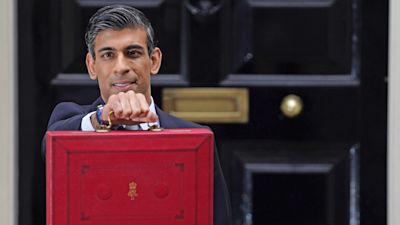Households face £3,000 hit by 2027 after tax rises and Budget measures, think tank warns

The average household could be hit by bills of an extra £3,000 per year by 2027 as a result of measures introduced since Boris Johnson came to power, including Wednesday's Budget, a think tank has warned.
Research by the Resolution Foundation also found that Britain could be set for a "flat recovery" for household living standards.
The foundation said this is due to tax rises that will result from the chancellor's Budget. Inflation, higher growth, and high public spending are also factors.
The Office for Budget Responsibility (OBR) said that the average household could see their taxes rise by thousands of pounds during Boris Johnson's time as prime minister.
The group said that the chancellor's Budget, which was announced on Wednesday, would leave the overall tax burden at its highest since Clement Attlee was in power, 70 years ago.
The Resolution Foundation said that by 2026-27 tax as a share of the economy will be at its highest level since 1950. This amounts to a £3,000 increase per household since Mr Johnson came to office in 2019.
Real wages in the UK are set to fall again in 2022, the foundation said. This follows the weakest decade of pay growth since the 1930s.
The government hit back at the think tank, saying it is "misleading" to say households will be hit with an additional £3,000 in taxes, because the figure "appears to include business and employers taxes which aren't applicable directly to households".
“The same report shows that the government's policies are set to boost incomes for those at the bottom of the distribution, and that higher taxes will mostly impact middle-to-higher income households," said Downing Street.
“This government’s decisions have been worth nearly £500 per year extra to households on average, and more than £1,000 for the poorest households – and that’s before factoring in wage growth, including the rise in the National Living Wage.”
The think tank - which focuses on low and middle income families - said that real wages are on course to grow by just 2.4% from May 2008 to May 2024.
This is a "a far cry" from the 36% real wage growth the country enjoyed between May 1992 and May 2008, the Resolution Foundation said.
The chancellor told ITV's Peston programme that he and Boris Johnson are committed to cutting tax.
Mr Sunak made the comments on Wednesday night, in what is seen as an attempt to reassure Conservative MPs he will cut tax before the next election.
The Chancellor said he and the prime minister cut taxes for the lowest paid in the country "to help them right now".
“By the end of this Parliament, I want taxes to be going down not up,” he added.
In a meeting with Conservative backbench MPs, he said he wants to use "every marginal pound" in the future, to lower taxes rather than increase spending.
The chancellor used an improved economic outlook to set out £150 billion of departmental spending as well as help for people on low incomes to tackle the rising cost of living.
Chief Secretary to the Treasury Simon Clarke said he made “no apologies” for the measures.
He said that Rishi Sunak was "very open" about his Budget announcement being part of a "philosophical shift".
Mr Clarke - who is MP for Middlesbrough South and East Cleveland - said the governments wants to get the economy "turbocharged" and "unlock productivity" to deliver growth more evenly across the UK.
"That does require some upfront spending", he said.
Tax cuts for businesses, extra cash for hospitals, a softening of the cut to Universal Credit and a freeze for fuel duty were also announced by Mr Sunak in his Budget.
Some of the key announcements from Rishi Sunak's Budget include:
A £2.2 billion package of Universal Credit reforms to allow claimants to keep more of the benefit if they earn more from work.
Around £7 billion worth of cuts to business rates following a review into the property tax, with the cancellation of next year’s increase in the rates multiplier and a 50% cut to next year’s rates for most retail, hospitality and leisure businesses.
A major overhaul of alcohol taxation, including cutting the cost of Champagne and prosecco, which Mr Sunak said are “no longer the preserve of wealthy elites” from 2023.
Pubs will be helped with a new lower rate of duty on draught products, knocking around 3p off a pint as part of the reforms.
Previously planned rises in alcohol and fuel duties will also be scrapped.
A cut in the surcharge levied on bank profits from 8% to 3%.
Flights between airports in England, Scotland, Wales and Northern Ireland will be subject to a new lower rate of Air Passenger Duty from April 2023.
Whitehall departments will receive a real terms rise in funding as part of the Spending Review, the Chancellor said, amounting to £150 billion by 2024/25.
A Labour MP accused the Conservatives of being the party of both high taxes and low growth this morning.
Pat McFadden, who was previously shadow business secretary, said the government has not been investing "in the workforce of tomorrow". Mr McFadden said the government needs to do this if it wants to see higher growth.
The Institute for Fiscal Studies will publish its analysis of the Budget later this morning.